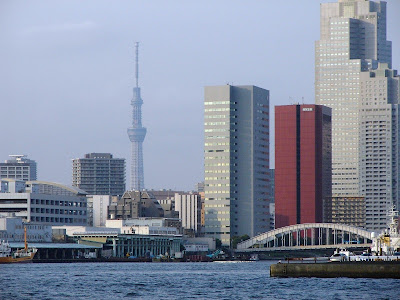Tokyo Bay...
New Economics (nouvelle économie)
There is a famous teaching by the Buddha:
"If a man was shot by an arrow, you should immediately take the arrow out of his body to stop bleeding. It is not time to discuss why and how he was shot by the arrow. You must cure him as soon as possible. Like this, I am teaching how to take away pain a man suffers in this world while he is in this world."
If national budget is at a crisis with huge deficit, it is not time to discuss why and how it happened. But, you have to swiftly find other financial resources and execute budget spending to help lives of poor people.
SECTION I: Financial Crises
The U.S. is rich or even the richest nation on the earth. But it has huge governmental financial deficit.
Japan is rich, even actually the second largest economy in the world, as part of its GDP is counted as China's. Yet, it has taken a scheme of rotation of money from domestic financial institutes to the government through transactions of government bonds.
(The Japanese national government bond, in trillion yen - http://ja.wikipedia.org/wiki/%E6%97%A5%E6%9C%AC%E5%9B%BD%E5%82%B5)
In the U.S., from 1980 to date, the amount of financial deficit has become 14 times larger.
In Japan, from 1980 to date, the amount of financial deficit has become 9 times larger.
Though both the countries have some factors (mighty industrial bases, natural resources, human resources, and political/military power) that balance the huge deficit, it is time to introduce New Economics.
The value of the U.S. dollar and the Japanese yen is the most important issue to be considered, though. But, if their money value is secured, everybody would accept New Economics that would offer solution to the financial deficit problem.
SECTION II: New Economics
Tax Revenue = Tax from Rich Men + Tax from Poor Men
Budget Spending = Needs for Rich Men + Needs for Poor Men
Ideally, Tax Revenue = Budget Spending
Accordingly, Tax from Rich Men + Tax from Poor Men = Needs for Rich Men + Needs for Poor Men
If the above equation is not balanced, the four terms should be carefully examined. Then, policy adjustment should be made. For example,
1) Increase tax on rich men.
2) Decrease needs for rich men.
3) Increase tax on poor men.
4) Decrease needs for poor men.
If it is impossible to take the above measures, a different paradigm is needed.
National Wealth = Rich Men's Wealth + Poor Men's Wealth + Tax Revenue + Potential Wealth
If it is impossible to collect more tax from rich men and poor men while tax revenue is insufficient, potential wealth must be used as a source for tax revenue. And, the potential wealth includes the right of the government to issue government notes in addition to bills from the central bank that is requested to follow economic rules and market principles.
For example, the U.S. can reason that it has $100 trillion potential wealth, and then it can move 10% of the potential, namely $10 trillion to its tax revenue. The federal balance between tax revenue and budget spending will be improved.
It also goes for Japan. The Japanese Government can reason that it has a potential wealth of 1000 trillion yen. If it uses 2% of it, it can cover damages incurred by victims of the 3/11 Disaster. All the government has to do is take up a sheet of paper, write down "20 trillion yen" on it, and bring it to the Bank of Japan to exchange it with BOJ's yen notes.
The relationship between the inflation rate and the interest rate should be also examined in light with the above paradigm. However, the exchange rate between the yen and the dollar will not be gravely effected if both the governments take this method in a harmonious manner.
*** *** *** ***
In a traditional term,
National Wealth = Individual Assets + Corporate Assets + Social Capital + Foreign Assets
The most important part of national wealth for Japan is produced assets. By leveraging the assets, added value is generated by Japanese businesses. Even in deflation of 15 years, Japan has steadily increased the produced assets. So, it is no wonder that the yen is appreciated higher, but presently the yen has become too strong against the U.S. dollar. The U.S. must take a corrective measure.
http://www.forexchannel.net/realtime_chart/usdjpy.htm
In addition, it is said that Japan had national wealth equivalent to more than 80% of America's, which is a big surprise when taking into consideration the difference in GDP between the two countries.
(Singing in a port after the 3/11 great tsunami...
http://www.youtube.com/watch?v=PITCzDKNWRw)
Mat 7:27 And the rain descended, and the floods came, and the winds blew, and beat upon that house; and it fell: and great was the fall of it.





